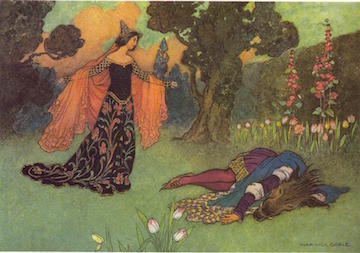Summary | Excerpt | Reviews | Beyond the Book | Read-Alikes | Genres & Themes | Author Bio

This article relates to Ninety-Nine Stories of God
I noted in my review of Joy Williams' Ninety-Nine Stories of God that it felt like a compilation of fairy tales. But then I began to wonder why I felt that way. On closer inspection, I perhaps learned why.
 Fiction, of course, is not factual, even if the writer uses known facts in order to mirror reality. Writers make things up; they invent people, they give them conflicts to resolve and obstacles to overcome, they build relationships and scenarios, and then they weave all of these imaginary elements together. Using this definition, one might say that fiction and fairy tales are synonymous. Fairy tales fall under the broad definition of fiction, particularly if we look at genres such as fantasy, horror and science fiction. But what elements are specific to fairy tales? After researching the subject, I found that one big difference is belief, and Williams' book deals heavily in that area.
Fiction, of course, is not factual, even if the writer uses known facts in order to mirror reality. Writers make things up; they invent people, they give them conflicts to resolve and obstacles to overcome, they build relationships and scenarios, and then they weave all of these imaginary elements together. Using this definition, one might say that fiction and fairy tales are synonymous. Fairy tales fall under the broad definition of fiction, particularly if we look at genres such as fantasy, horror and science fiction. But what elements are specific to fairy tales? After researching the subject, I found that one big difference is belief, and Williams' book deals heavily in that area.
Vincenzo di Kastiaux, in his book The Brothers Grimm: Complete Fairy Tales Grimm vs. Disney, explained: "Fairy Tale signifies beliefs in the supernatural, not the suspension of belief. We all believe in the extra-ordinary of Once Upon a Time. We need to believe. We breathe through our tales." One way to look at Ninety-Nine Stories is that the God in them (or as Williams calls it, the Lord) is a supernatural being, which many people want to, and even need to believe in. Furthermore, many of the stories presented here are ones where the Lord is involved in situations that are distinctively earth-bound (for example, visiting a pharmacy to get vaccinated against shingles). This juxtaposition allows the reader to suspend disbelief and imagine familiar reality that can also contain content that is celestial or heavenly. It is therefore not a huge stretch to place William's vignettes within the fairy tale category.
However, trusting in the possibility of the fantastical isn't enough for a story to be considered a fairy tale. Jack Zipes, an expert in the field of fairy tales notes that:
… we absorb fairy tales because they tell us more truth than we want to know. They are filled with desire and optimism. They drip with brutality, bluntness, violence, and perversity. They expose untruth, and the best are bare, brusque, and concise. They stamp our minds and perhaps our souls. They form another world, a counter world, in which social justice is more readily attained than in our actual world where hypocrisy, corruption, hyping, exploitation, and competition determine the outcome of social and political interactions and the quality of social relations.
Certainly, in the very complex and harsh reality of the world we live in today, we need the escape of fiction. Fairy tales give us this, while helping us face some of the less than savory truths we see around us every day, through allegory and metaphor. Fairy tales also allow us to dream of a different type of world, and watch it unfold in front of us, and discover for ourselves the moral of the story. Williams brings all of this together by using both cynicism and humor; she lets us ponder the world and wonder about things; she places truths in front of us, in all their beauty and ugliness, without telling us what to think about them. It would seem, therefore, that these short missives do meet at least some of the criteria for being fairy tales.
Beauty and the Beast, illustration by Warwick Goble
Filed under Books and Authors
![]() This "beyond the book article" relates to Ninety-Nine Stories of God. It originally ran in August 2016 and has been updated for the
September 2018 paperback edition.
Go to magazine.
This "beyond the book article" relates to Ninety-Nine Stories of God. It originally ran in August 2016 and has been updated for the
September 2018 paperback edition.
Go to magazine.
Your guide toexceptional books
BookBrowse seeks out and recommends the best in contemporary fiction and nonfiction—books that not only engage and entertain but also deepen our understanding of ourselves and the world around us.